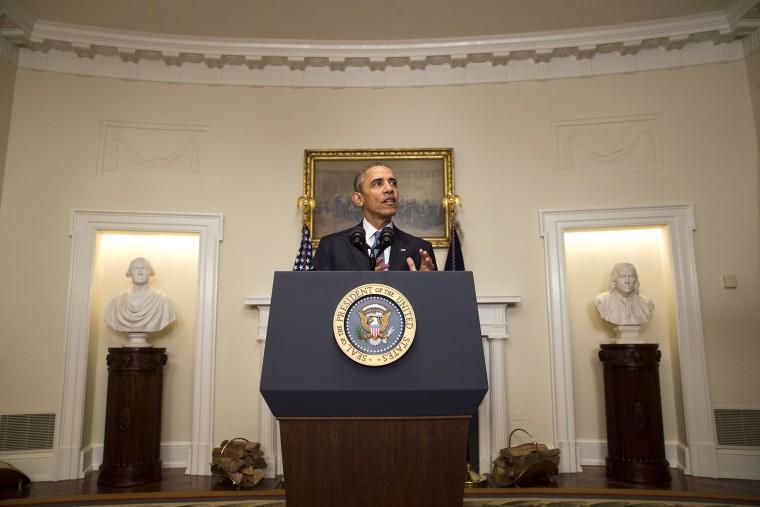President Obama praised the first-ever international climate change plan struck on Saturday as the "best chance we have to save the one planet we've got" — but it's "not perfect," he added.
“In my first inaugural address, I committed this country to the tireless task of combating climate change and protecting this planet for future generations," Obama said in an address from the White House on Saturday evening. "A few hours ago we've succeed. We came other around the strong agreement the world needed. We met the moment. Together we've shown what's possible when the world stands as one."
RELATED: Climate deal: The good, the bad, the still unknown
Earlier in the day, representatives from more than 190 countries agreed to unanimously adopt the blueprint. The plan, which comes after 13 days of international negotiations, mandates all countries reduce greenhouse emissions, which scientists and climate activists said directly contribute to high temperatures and rising sea levels.
The resolution also seeks to keep the rise in global temperatures “well below” two degrees Celsius (3.6 degrees Fahrenheit) from pre-industrial times to the end of this century and “endeavor to limit” them even further, to 1.5 degrees Celsius.
“Today the American people can be proud, because this historic agreement," Obama added. "This is a tribute to American leadership. Over the recent years, we've transformed the United States into the global leader in fighting climate change."
The success of this ambitious agreement, which goes into effect in 2020, relies largely on the cooperation of all counties. It will not impose sanctions on those that do not abide by its pledge, NBC News reported.
While noting that the agreement wasn't flawless, the president added that it establishes the "enduring framework the world needs to solve the climate crisis." He urged countries to stay committed to the agreement, adding, "we've shown that the world has the will and the ability to take on this challenge."
This is a major diplomatic achievement for Obama, who has made climate change a signature issue during his presidency, despite continuous rebuke from the Republican-controlled Congress. Republicans often dispute the scientific consensus that links man-made pollution to global warming.
A day after climate talks in Paris began on Nov. 30, the GOP-controlled congress, with support from the crowded Republican presidential field, made efforts to undercut the president’s climate change pledge. The House passed two measures, mostly along party lines, that would block the Environmental Protection Agency's plans mandating a 32 percent cut in the power sector’s carbon dioxide emissions by 2030 and setting limits on carbon emissions produced by newly built power plants that use coal or natural gas.
RELATED: Bernie Sanders wants more from the Paris climate accord
The Senate passed similar measures, which Obama has promised to veto. Republicans would not be able to get a two-thirds majority needed for an override. Senate Republican Leader Mitch McConnell of Kentucky, who has been leading the opposition against Obama’s climate change efforts, said the president is waging “war on coal” and a “attack on the middle class.”
The three Democratic presidential hopefuls, Hillary Clinton, Bernie Sanders and Martin O’Malley, have shown support for Obama’s efforts to tackle climate change and vowed to lower emissions if elected.
Sanders, who has made climate change a major issue on the campaign trail, said minutes after the agreement on Saturday that while it is a step forward, “it goes nowhere near far enough."
